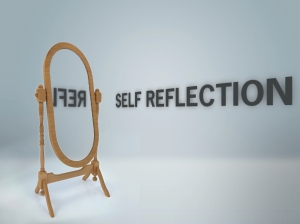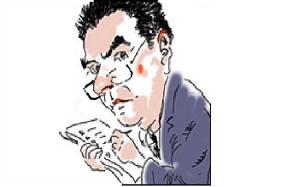My take on the current debate surrounding lesson observation!
Reflection
Definition
noun
1. the act of reflecting or the state of being reflected
2. careful or long consideration or thought
One of the most beneficial aspects of reading the musings of the Twitterati is that it has undoubtedly made me a more reflective practitioner. It’s fair to say I’m opinionated about most things education and I love that I’m having my thinking challenged on a daily basis. You can’t help but question your deeply held beliefs about pedagogy and increasingly I’m finding myself forced to reconsider some of what I believe about Teaching and Learning, the leadership of it and whether this is actually right.
Hotly debated over the last week or so has been the future of lesson observation and I tuned in from Dubai (thanks to Livestream and @eyebeams) with great interest, to the live debate held at Teach First last Monday evening (13th January 2014). The academic evidence cited by Professor Robert Coe in his blog/presentation questioning the validity and reliability of observation, was food for thought, somewhat worrying, but not necessarily a surprise or earth shattering to me. Observing one off lessons is not an exact science, a highly subjective practice and somewhat flawed as a measure for assessing teacher quality all by itself. Quite rightly Coe suggests schools need to raise their game and continually evaluate the effectiveness of their quality assurance process.
Currently at my school it is policy to grade formal lesson observations, aside from our annual DSIB inspection, this will happen on average twice in an academic year for most of our teachers. The usefulness of relying on irregular graded formal lesson observations, to accurately assess teacher performance has troubled me for some time. 30 minute snapshots can be misleading, observations are stress packed rituals for staff and they do very little to improve teacher quality. They are a measurement tool.
I really like the model for school improvement suggested by Chris Moyse @ChrisMoyse in his post ‘Professional development at my academy-no lesson grades ever!’ and using this approach has long been advocated by the likes of Dame Alison Peacock @AlisonMPeacock who also spoke at the Teach First debate on Monday night. I know of schools in Dubai who have also ditched formal lesson observations and gradings and fall into the category of ‘Outstanding’ in their most recent inspection rating. I don’t think it is as much of a risk for schools to do this, as some people are suggesting. To my knowledge inspection teams don’t ask for a list of staff with gradings?(correct me if I’m wrong on this one?).
Which begs the question will we move away from grading lessons at my school? Certainly something I think we would be prepared to open up to debate and discussion, all debate is healthy, though I’m currently undecided as to whether this is necessarily the answer. For me there needs to be some measure for accountability. Even if we abandon formal gradings, I don’t think it is as simple as that, as humans we cannot help but be judgmental and I am in agreement with Ross McGill @TeacherToolkit in his post, ‘The role of lesson observations’.
“Even if judgments – regardless of validity – are removed; we will always be forming ‘a judgment of sorts’, on other teachers. I know this because: support staff; colleagues; parents; sixth form students; trainee-teachers, all of whom walk into my classroom at some time or another … even if they do not have the awareness, are making some type of judgments on my classroom environment and my teaching ability. This will not disappear – even if formal judgments do.”
Reading Joe Kirby’s blog post earlier comparing graded lesson observations to Brain Gym, I find this claim a little excessive…..however entirely in agreement that should schools continue to grade, this needs to be based on a triangulation of evidence, observation, learning walks, books and the impact of the teacher on student performance over time. There certainly needs to be a mind shift amongst educators as to what the primary purpose of lesson observation should be, ask yourself what does observation mean at your school? is it a formative, developmental process and a tool for improving teacher learning?
“If we just use them formatively, teachers can focus on improving rather than being judged, and school leaders can combine quantitative assessment data, qualitative feedback from colleagues and their own intuition to form nuanced judgments of teaching quality” @Joe_Kirby
Personally I have always learned more from observing than I ever have from being observed and a large part of the philosophy for teacher learning behind our staff pedagogy groups and coaching programmes implemented this academic year, was to give all teachers the opportunity to observe and learn from one another. I look forward to evaluating this over the forthcoming months and continuing to explore how we can “do” observation even better and more effectively at our school.
“If the goal of leaders is to coach teachers, it is foolish to observe only one or two times a year. Imagine if a tennis coach said that he would only watch players once every six months, but that he would fill out a detailed report after each visit. If this seems ridiculous, remember that teaching is no different. Teachers, like tennis players, need consistent, regular feedback and practice to improve their craft.” Paul Bambrick-Santoyo @paul_bambrick
“I’m not against observation, I just think we should do it better” Professor Robert Coe
Since September 2013, at my school, in addition to two other coaching programmes, we have also conducted a ‘coaching for improvement’ pilot, whereby we have been trialling a more developmental/non graded approach to classroom observation. The thinking behind this that the primary purpose of observation should not be to judge the quality of teachers, but to find the most effective ways to coach them to improve student learning. Feed the elephant, stop weighing it!
Giving less feedback, more often, maximises teacher development. Staff involved in the pilot have carried out short (10-15 min) frequent (every other week) classroom visits. A coaching session then follows in which feedback is given, the following visit can then be used to watch feedback being put into place. It is key here that areas for improvement are bite sized and achievable over a small time frame. The coach/coachee keep a tracker and as leader of T&L I have an overview of all the trackers to see what areas of their practice, teachers are currently working on.
I recently sent out an evaluation form to those staff involved in the pilot and all responses indicated that so far the programme has had a positive impact on their teaching practice.
“It has been very helpful to have informal observations, where I can try out different strategies and discuss the strengths and weaknesses without the pressure of grading. It makes it easier to then make improvements without the pressure of a judgment.”
“The programme has enabled me to try out new strategies and tasks. Receiving feedback which encouraged me to reflect on the progress of individual students and the effectiveness of tasks and strategies used to move the learning forward. Definitely found the programme a benefit!”
“Being a coach has encouraged me to read and explore more, seeking out particular pedagogical solutions to issues identified. This process has had a natural impact on my own practice in the classroom.”
Observation occurring on a more or less weekly basis, making the whole experience less, rather than more stress intensive for staff. This approach works, we know it does, and as far as I can see is the most highly effective route to teacher improvement. It only comes with one cost, so far as I can see, and that is time. We have decided to roll out the programme to include more staff as of this term and have plans as to how we can develop this even further next academic year.
I first encountered the above ‘Lesson study’ model for observation and teacher development, last summer and at this time had some communication with David Weston @informed_edu and the staff at the ‘Teacher Development Trust’ about joining the NTEN (National Teacher Enquiry Network) and how we could possibly participate, as a school, from the UAE. I see collaboration between teacher/schools as essential for the development of Teaching and Learning in Dubai, some exciting things do happen already, SPARK Teachmeets, ‘What Works Dubai’ and collaboration between schools, though I would like to see this develop even further for us and did write about forming a Dubai Teaching and Learning Partnership in May last year.
I have recently been reading with great interest the success of this style of CPD from the blog posts of Tom Sherrington @headguruteacher ‘Getting started with Lesson study’ and Rachael Stevens @murphiegirl ‘Using lesson study to spot RHINOS’ plus others. Convinced that lesson study is the way forward for establishing a ground roots approach to CPD and something that I am going to trial with a group of teachers in a training session next Wednesday, so hopefully we will get it officially kickstarted at SRS this term.
Related to turning pre conceived ideas on their heads this week, I really enjoyed reading @learningspy David Didau’s post ‘The cult of outstanding’ I’m sure the best of us will recognise some of the traps we have previously fallen into in our pursuit of the secret behind outstanding teaching. I pretty much agree with most of what is written here, I don’t think that passivity should be necessarily sneered at (neither do Ofsted). Michael Wilshaw has repeatedly refuted claims that Ofsted promote a particular style of teaching and repeated this again in his speech in Nottingham a few days ago.
I’m not convinced that expecting to see collaboration between students in pretty much every lesson is “preposterous”. Collaboration to me means talk and working in a school where 99% of the students are EAL, we encourage and actively promote talk for learning as key to the development of our particular student’s needs and I would expect to see students participating in talk during lessons as the norm. I have yet to look at a passive student and believe that behind it all, there may be “concealed a vigorous and seismic inner turmoil that heralds real learning” as David describes, but there is and always will be a place for teachers needing to tell kids stuff, agreed and surely great teaching is about balance.
All in all a fascinating week in blogsphere and loads of food for thought, I for one am looking forward to seeing how the debate surrounding outstanding teaching and formal lesson observations pans out. Would love to hear from more Senior Leaders about their thoughts on how to improve the reliability and validity of formal observation and how they use these to develop their staff?
Rachael Edgar
@Dubai_Teachmeet
@Dubai_Leadmeet






January 18, 2014 at 3:18 pm
Reblogged this on The Echo Chamber.
January 19, 2014 at 9:33 pm
Reblogged this on Glitter, Giggles and Lesson Plans and commented:
As a 2nd year trainee primary school teacher about to have her final Assessment Review and lesson observation tomorrow (on the first day of the third week of my month long placement in a SEN school for the very first time, no less!) I know full well how stressful formal grades observations are. This article raises some very good points – whilst we can learn from being observed I know myself that I learn so much more from observing others and reflecting on my practice compared to theirs, and trying things out that I’ve reflected on.
January 27, 2014 at 11:03 pm
“I’m not convinced that expecting to see collaboration between students in pretty much every lesson is “preposterous”. Collaboration to me means talk and working in a school where 99% of the students are EAL, we encourage and actively promote talk for learning as key to the development of our particular student’s needs and I would expect to see students participating in talk during lessons as the norm. I have yet to look at a passive student and believe that behind it all, there may be “concealed a vigorous and seismic inner turmoil that heralds real learning” as David describes, but there is and always will be a place for teachers needing to tell kids stuff, agreed and surely great teaching is about balance.”
This is an excellent point; I work in a school in stoke on Trent with around 50% EAL and this is the main focus when planning my lessons.